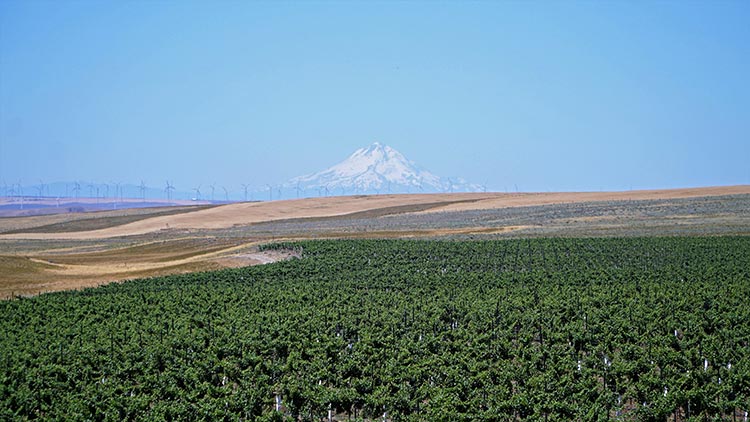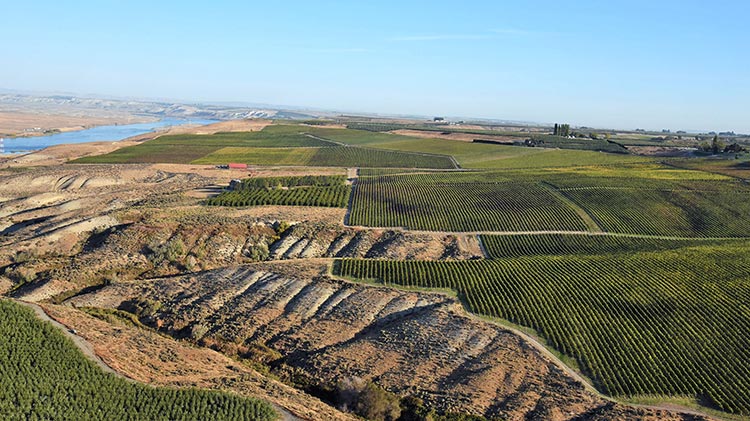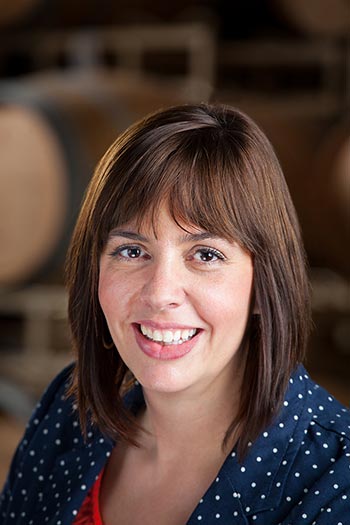We cover the rising trend of women winemakers, four new appellations, tasting room booms in both Woodinville and Vancouver USA, and other news

Written by Sean P. Sullivan
THE growing season that culminated with the 2021 harvest in Washington was marked by high-quality fruit that already has winemakers excited. However due to a confluence of circumstances involving a light set the prior year, high heat at bloom, and other factors, the crop came in substantially lighter than hoped. Cabernet Sauvignon was the most impacted variety, down in some cases by 30% or more. Bottom line: Winemakers are thrilled with what they have in barrel from 2021. They just wish that they had more of it.
Here are other headlines shaping the wine industry in Washington this year.
Chateau Ste Michelle sold
While a possible sale of Chateau Ste Michelle had been palace intrigue in the industry for years, it still came as a shock when the winery was sold to a private equity firm in 2021. Ste Michelle is more than just one of Washington’s founding wineries. Along with its sister wineries (including Columbia Crest, H3, 14 Hands, and others) it makes more wine than any other producer in the state. While initially there was some hand-wringing at the idea of the state’s vinous “string of pearls” falling into the hands of a private equity firm, this actually appears to be good news for Washington wine lovers.
First, it keeps Ste Michelle’s leadership intact. Second, it allows the company to remain principally a Washington wine-focused brand instead of being bought by a larger, out-of-state winery that might take it in a different direction. Early reports are that Sycamore, the company that purchased the winery, plans to keep it intact.
“We had a solid plan to present [Sycamore] in terms of our vision for the future,” says Ryan Pennington, communications director at Ste Michelle Wine Estates. “They’ve been very clear that they are buying into our people and our culture, as much as they are buying the company itself.”
The responsibility is now on Ste Michelle to successfully execute its plans and on Sycamore to enable the winery’s success. We should all toast to that.
Four new appellations for the state
Fresh on the heels of the approval of Royal Slope and Candy Mountain in 2020, Washington received three new appellations in 2021: White Bluffs, The Burn of Columbia Valley, and Goose Gap. A fourth, Rocky Reach, was approved at the beginning of 2022. This brings the state to 20 total appellations.
Some of the names are familiar. Others are new. White Bluffs is home to some of the state’s oldest plantings, including Bacchus, Dionysus, and Sagemoor vineyards.
“It’s long been known but not named,” says Kent Waliser, director of wine and grape sales for Sagemoor Vineyards. Vineyards in the appellation are located on a bluff above the Columbia River. The added elevation extends the growing season by helping to protect against frost and freezes. The appellation also has a unique subsoil, referred to as Ringold Formation.

The Burn of Columbia Valley meanwhile is a much younger growing region, with most of its plantings put in since 2015. The appellation is on a series of benches by the Columbia River. The area is windier and also wetter than the Columbia Valley. The result is a “warm region that acts more like a cool one,” according to Kevin Corliss at Ste Michelle Wine Estates. Most of the fruit from the Burn goes into Ste Michelle’s Borne of Fire label.
Goose Gap is adjacent to Red Mountain and Candy Mountain. The appellation had its first plantings in 1998. It gets its name from a saddle between Goose Hill, Badger Mountain, and Candy Mountain that is a common flight path for waterfowl.
“There is so much diversity in such a small area,” says Goose Ridge winemaker Andrew Wilson. “I would say the one thing that stands out to me most is this sense of freshness that the wines have.”
Rocky Reach meanwhile is just south of Lake Chelan. The appellation is distinctive from others in the Columbia Valley in that it is not underlain by the valley’s ubiquitous basalt bedrock. Instead, Rocky Reach has granitic bedrock. The area also has soils made of cobblestones from glacial outwash, ancient floods, and the Columbia River.
One additional appellation, Wanapum Village, remains in the pipeline. After that, expect a lull before more appellations are approved.
Woodinville continues to boom
Already home to 130 wineries and tasting rooms, Woodinville is showing no signs of slowing down. In recent years, DeLille Cellars and Sparkman Cellars remodeled the old Red Hook Brewery and turned it into production facilities and tasting rooms. In 2022, they’ll have company.
Mark Ryan, Long Shadows, Fidelitas, and Latta will all open tasting rooms in this same neighborhood in 2022. Each will have a multi-level facility, with outdoor decks and patios as well as bountiful parking.
“We’ve been around for 21 years now,” says Mark McNeilly, founder of Mark Ryan. “It’s going to be nice to honor the whole history and show people that history in this new building.”
Additionally, Brian Carter Cellars joins a number of wineries that have moved into Woodin Creek Village, a mixed-use development over by Woodinville town center. Rocky Pond, Adams Bench, Bayernmoor Cellars, Baer, Ancestry Cellars and several others all have tasting rooms in this rapidly-populated area.
“Not only have we opened up a great space to taste wine, but a full kitchen gives us the ability to match the wines with exquisite cuisine,” says Brian Carter.

L’Ecole N° 41, one of Walla Walla’s founding wineries, will soon open a new tasting room in Wine Walk Row over in The Schoolhouse District, another mixed-use development near Woodinville’s City Hall. “We’ve long-considered expanding our flagship Walla Walla Valley location into the Seattle area, and particularly Woodinville,” says owner Marty Clubb. “The whole prospect felt serendipitous.” L’Ecole N° 41 will be one of several wineries on Wine Walk Row, among them Oregon’s Montinore and Landlines Estates.
Meanwhile the largest project in the area, Harvest (called Woodinville Wine Village in a previous incarnation), has plans to begin construction in 2022. This 20-acre, mixed retail and residential space guarantees to further transform Woodinville wine tasting in the years ahead.
Vancouver a new tasting hot spot
Woodinville isn’t the only area showing strong growth. Vancouver, Wash. is another city that has seen an explosion in tasting rooms in recent years. Longtime wineries Maryhill, Brian Carter, Pepper Bridge and Amavi have all opened tasting rooms in the downtown waterfront district. So has newcomer Valo and Massalto, two projects from Gård Vintners’ winemaker Matías Kúsulas.
“We just saw an opportunity there,” says Kúsulas. “I think it’s an exciting region.”
Given the city’s proximity to Portland, Vancouver is a logical spot for wineries to set up shop. This is also part of a larger trend, as more and more Washington wineries open satellite tasting rooms in order to sell as much wine direct-to-consumers as possible.
Recent years have seen wineries open satellite tasting rooms in Leavenworth, Spokane, Chelan and other locations. With the consolidation of distributors and retailers creating an increased focus on direct sales, expect this trend to stick around.
Women on the rise
Women have a long and proud history in the Washington wine industry. However, they have also made up a considerably smaller percentage of the winemaking ranks than their male counterparts.
The tide seems to be turning. Two prominent wineries put women in charge of production in 2021. The first was Chateau Ste Michelle, which elevated Katie Nelson, whose resume includes winemaker for Charles Smith Wines and Columbia Crest.

“I think every winemaker brings a unique perspective and kind of a different way of doing things and brings their own palate,” says Nelson. “My goal is to continue making great wines for Chateau St. Michelle like they have in the past and really showcase each site and each place within Washington.”
The second comes from the cult side of the industry, where Christophe Baron at Bionic Wines in Walla Walla Valley promoted Elizabeth Bourcier to resident vigneronne. Bourcier will now oversee production of some of the world’s most highly-regarded wines, including the entire portfolios for Cayuse, Horsepower, No Girls, and Hors Catégorie.
“It’s an exciting time for women in wine, especially in the Walla Walla Valley,” Bourcier said in an email to customers. With local community colleges churning out top-flight talent, expect those exciting times to continue for years to come.
Staffing merry go-round
There has been much discussion of the Great Resignation that took place in 2021. The Washington wine industry also saw numerous changes at high profile positions.
In addition to the two changes mentioned above, long-time winery J. Bookwalter in Kennewick also saw a change, with Jeremy Santos taking the reins of its 50,000 case per year production. “It was too good of an opportunity to pass up,” says Santos, who had previously been at Mercer Estates. “The winery has such a great heritage, the grape sourcing is amazing, and the Bookwalter quality is through the roof. It’s a great thing to walk into.” Bookwalter also completed construction of a new, 20,000-square foot winery and tasting room in 2021.
Among other significant changes were at Matthews in Woodinville, which hired the team of Alex Stewart, Jesse Schmidt and Hal Iverson. The three had previously worked together at Quilceda Creek.
“Alex and I have been friends for a long time, and the stars just aligned right now for everybody,” says Matthews proprietor Bryan Otis.
“The fact that they’re coming over and working on stuff that we feel passionate about is really, really special.”
With the Great Resignation continuing, expect more winemaker shuffling in 2022.
Betz declassifies 2020 vintage
While there was a lot of exciting news in Washington wine last year, there were some less positive developments. Betz Family Winery in Woodinville announced it would not be releasing its 2020 vintage wines due to concerns about smoke impact from wildfires.
“We determined that there’s absolutely no way we would ever produce a [2020] vintage of Betz,” owner Steve Griessel said after months of his team doing sensory and analytic testing of the wines.
While Betz won’t be releasing its 2020 wines, many other producers are optimistic about what will come out of the vintage. Many high-quality white wines have already been released.
